外研版(2019)选择性必修 第四册 Unit 2 Lessons in life Using language Listening课件(共27张,内嵌音频)
文档属性
| 名称 | 外研版(2019)选择性必修 第四册 Unit 2 Lessons in life Using language Listening课件(共27张,内嵌音频) | 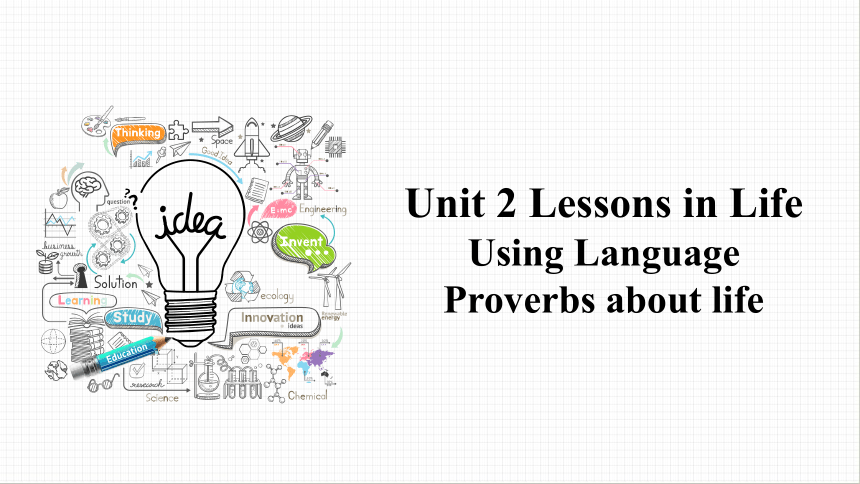 | |
| 格式 | pptx | ||
| 文件大小 | 6.3MB | ||
| 资源类型 | 教案 | ||
| 版本资源 | 外研版(2019) | ||
| 科目 | 英语 | ||
| 更新时间 | 2025-05-02 20:26:37 | ||
图片预览

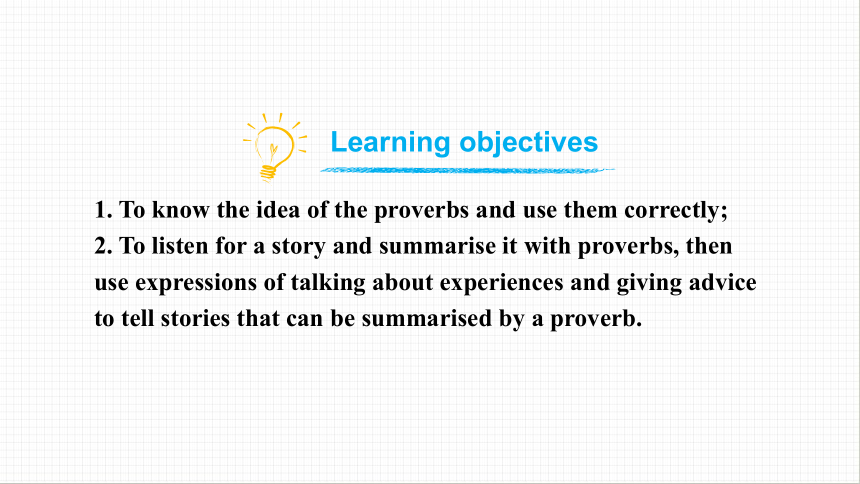
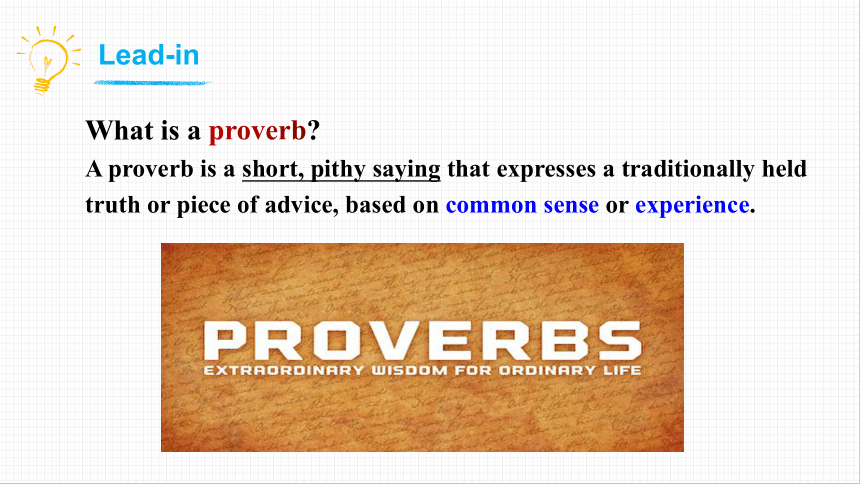
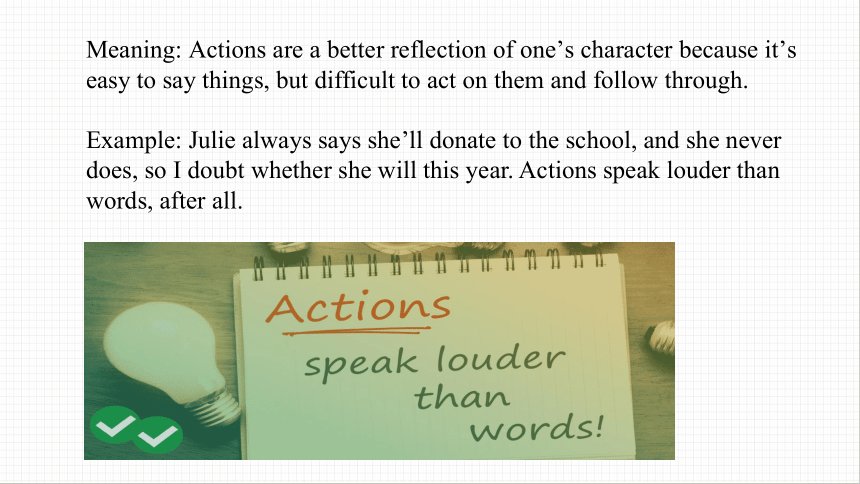

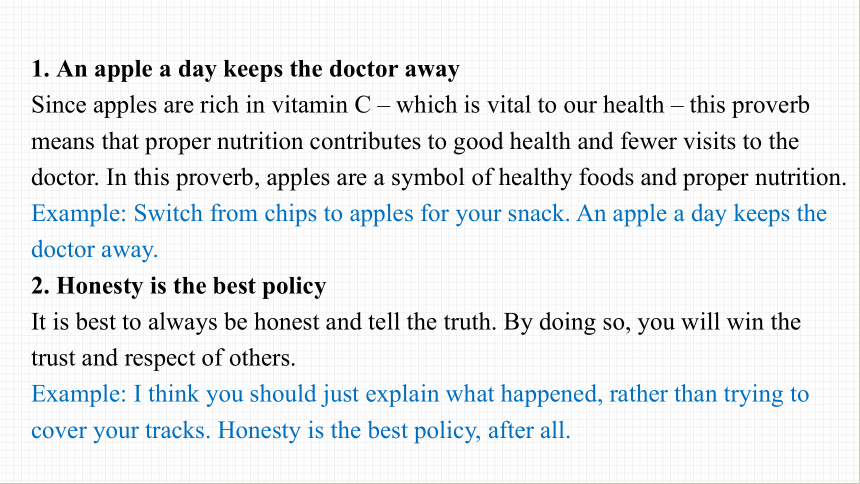
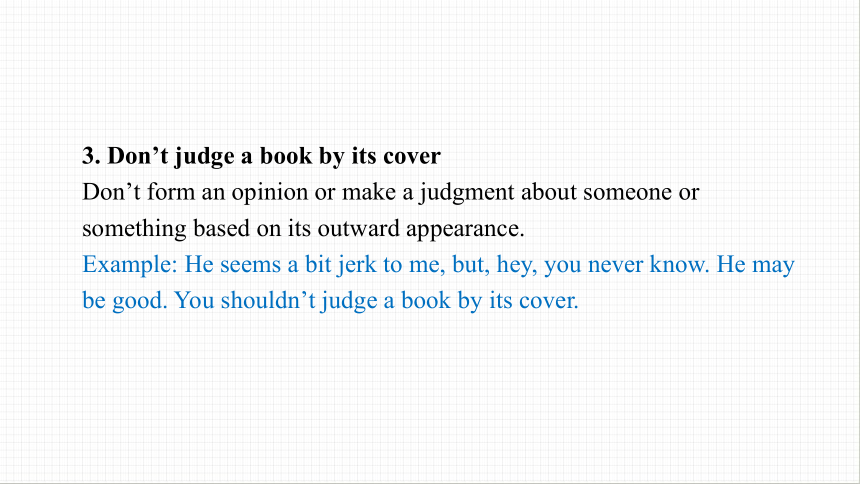
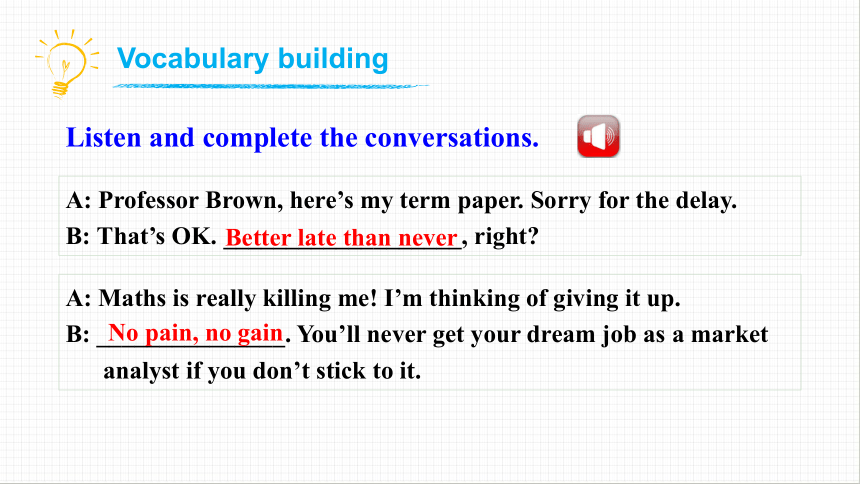
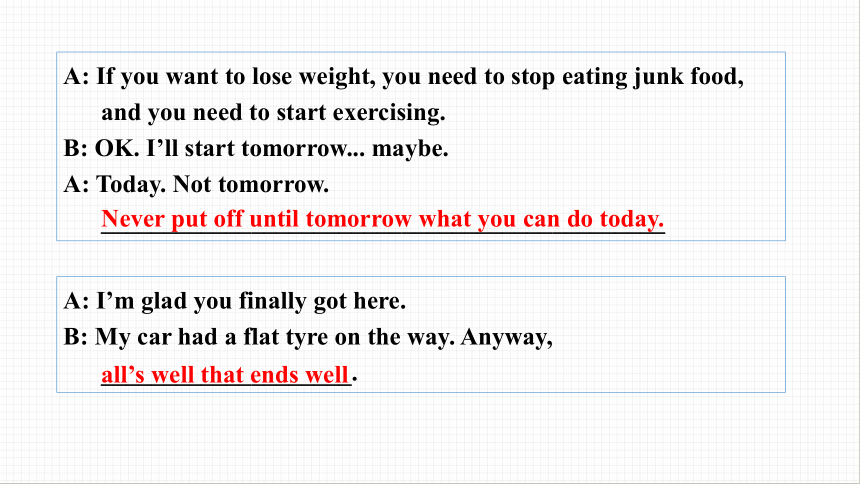
文档简介
(共27张PPT)
Unit 2 Lessons in Life
Using Language
Proverbs about life
Learning objectives
1. To know the idea of the proverbs and use them correctly;
2. To listen for a story and summarise it with proverbs, then use expressions of talking about experiences and giving advice to tell stories that can be summarised by a proverb.
What is a proverb
A proverb is a short, pithy saying that expresses a traditionally held truth or piece of advice, based on common sense or experience.
Lead-in
Meaning: Actions are a better reflection of one’s character because it’s easy to say things, but difficult to act on them and follow through.
Example: Julie always says she’ll donate to the school, and she never does, so I doubt whether she will this year. Actions speak louder than words, after all.
What proverbs do you know
Which one is your favourite
1. An apple a day keeps the doctor away
Since apples are rich in vitamin C – which is vital to our health – this proverb means that proper nutrition contributes to good health and fewer visits to the doctor. In this proverb, apples are a symbol of healthy foods and proper nutrition.
Example: Switch from chips to apples for your snack. An apple a day keeps the doctor away.
2. Honesty is the best policy
It is best to always be honest and tell the truth. By doing so, you will win the trust and respect of others.
Example: I think you should just explain what happened, rather than trying to cover your tracks. Honesty is the best policy, after all.
3. Don’t judge a book by its cover
Don’t form an opinion or make a judgment about someone or something based on its outward appearance.
Example: He seems a bit jerk to me, but, hey, you never know. He may be good. You shouldn’t judge a book by its cover.
Listen and complete the conversations.
A: Professor Brown, here’s my term paper. Sorry for the delay.
B: That’s OK. ___________________, right
Better late than never
A: Maths is really killing me! I’m thinking of giving it up.
B: _______________. You’ll never get your dream job as a market analyst if you don’t stick to it.
No pain, no gain
Vocabulary building
A: If you want to lose weight, you need to stop eating junk food, and you need to start exercising.
B: OK. I’ll start tomorrow... maybe.
A: Today. Not tomorrow. _____________________________________________
Never put off until tomorrow what you can do today.
A: I’m glad you finally got here.
B: My car had a flat tyre on the way. Anyway, ____________________.
all’s well that ends well
A: With my brother’s help, I finally completed my biology project!
B: Congratulations! __________________________.
Two heads are better than one
A: I heard that Mary is going to invest all her money in this programme.
B: That’s not wise. As people usually say, “__________________________________”. I’ll talk to her as soon as possible.
Don’t put all of your eggs in one basket
Match the above proverbs to their meanings.
1 ______________________________:
you must face challenges in order to be successful
No pain, no gain.
2 _______________________________:
it is easier to achieve something if you cooperate with someone else
Two heads are better than one.
v. 合作,协作
3 _____________________________________:
doing something late is better than not doing it at all
Better late than never.
4 _____________________________________________:
you should start things earlier rather than later
Never put off until tomorrow what you can do today.
5 ___________________________________:
do not put all your efforts or resources into doing one thing
Don’t put all of your eggs in one basket.
6 _________________________________:
problems don’t matter if the final result is good
All’s well that ends well.
Think of other proverbs about life. Can you find Chinese proverbs with similar meanings
It is never too old to learn.
A friend in need is a friend indeed.
I suffered a strange disease. No doctors could tell me exactly what it was and how they could cure it. I stayed in the hospital and felt there was no hope in my life. At this time, my friend Jack came. He stayed with me throughout the time I was helpless.
A friend in need is a friend indeed!
Think of other situations to which these proverbs can be applied.
Rome was not built in a day.
A slow sparrow should make an early start.
A bird is known by its note, and a man by his talk.
Practice makes perfect.
A match will set fire to a large building.
Facts speak louder than words.
In most countries, the average age for starting university is 18 years old, but actually there is no upper age limit for starting a university degree. Recently, there has been an increase in the number of mature students going to university, after working for a few or many years. The oldest person to get a Cambridge MA received his law degree at the age of 102. In China, a man from Jiangsu Province graduated from university at the age of 88, making him the oldest university graduate in the country.
Listen to an interview about how an old lady achieved her dream.
First, listen and get the main idea. Find out who and what she did.
Second, listen again and find out more details. Read the given information and complete the missing part while listening.
Listening and Speaking
Listen to the interview and choose the best headline.
1 University Fees Are No Barrier to Grandma!
2 Dream Comes True for Graduating Grandma
3 Janet Says: “Family first! That’s what matters!”
4 How the Student Experience Has Changed with the Centuries
n.工作酬金;服务费
Listen again and complete the notes.
Interview with Janet Rose
Age: _______
First attended university in: ________
Reason for leaving university:
___________________________________________________
Reasons for going back to university:
___________________________________________________
___________________________________________________
81
1955
She took care of her ill mother and helped her father.
Her daughter suggested she go back to school five years ago and she jumped at the chance.
There is nothing unusual about that except that Janet is an 81-year-old grandmother.
I started university back in 1955, but in my first year my mother fell very ill... So I went home to Texas to take care of her to help my father.
But then five years ago my daughter Candy suggested I go back to school and I jumped at the chance.
Initial feelings on returning to university:
______________________________________________
University major: __________________________
Feelings on graduation: _________________________
Advice to others: _______________________________
Future plans: __________________________________
She felt a bit nervous at first and she felt so old.
American literature
She feels great.
You’re never too old to learn.
Starting a master’s degree in the fall
I felt a bit nervous at first... I was surrounded by all these smart young people with their electronic gadgets, and I felt so old.
So you have just graduated with a degree in American Literature.
It feels great. I’m trying to live my life to the full.
I suggest that if you are thinking of going back to school, do it. ...And remember, you’re never too old to learn.
I’m starting a master’s degree in the fall.
Interviewer: Last week Janet Rose graduated from South Omaha University with a degree in American literature. There is nothing unusual about that except that Janet is an 81-year-old grandmother. Yesterday we caught up with Janet and asked her to tell us her story. Good morning, Janet. Why did you wait so long to get a degree
Janet: Ha ha! That’s a good question and one that nearly everyone asks me. Well, let me see. I started university back in 1955, but in my first year my mother fell very ill and she couldn’t help my father run the family business any more. So I went home to Texas to take care of her and to help my father. After that I never really thought about going back to study.
Interviewer: Why not And what changed your mind
Janet: I thought it was too late. But then five years ago my daughter Candy suggested I go back to school and I jumped at the chance.
Interviewer: How did you feel going back to university after all these years
Janet: I felt a bit nervous at first. I mean, I was surrounded by all these smart young people with their electronic gadgets, and I felt so old. But the students and teachers were kind to me and I soon got used to the classes. They even let me join some of their activities, and I became good friends with some of them. I soon got used to studying, using online resources as well as reading books and articles. It was hard work, but fun.
Interviewer: So, you have just graduated with a degree in American literature. How does It feel
Janet: It feels great. I am trying to live my life to the full. I don’t want to sit around at home all day watching daytime TV.
Interviewer: That’s fantastic to hear. Janet, do you have any advice for other senior citizens considering going back to university
Janet: I suggest that if you are thinking of going back to school, do it. You’ll find that studying again opens up a new world of opportunity to you. And remember, you’re never too old to learn.
Interviewer: Thank you for your time, Janet. Finally, what are your plans now
Janet: Oh, didn’t I say I'm starting a master’s degree in the fall.
I started ... back in ...
After that I ...
But then five years ago ...
I felt ... at first.
I suggest that ...
Remember, ...
Complete the boxes with the expressions from the interview.
Talking about experiences
Giving advice
I started ... back in...
After that I ...
But then five years ago...
I felt ... at first.
I suggest that...
Remember, ...
Work in pairs. Tell each other a story about yourself that can be summarised by a proverb in this section.
Talk about how effectively you and your partner used your own experiences to illustrate your understanding of the proverbs.
Unit 2 Lessons in Life
Using Language
Proverbs about life
Learning objectives
1. To know the idea of the proverbs and use them correctly;
2. To listen for a story and summarise it with proverbs, then use expressions of talking about experiences and giving advice to tell stories that can be summarised by a proverb.
What is a proverb
A proverb is a short, pithy saying that expresses a traditionally held truth or piece of advice, based on common sense or experience.
Lead-in
Meaning: Actions are a better reflection of one’s character because it’s easy to say things, but difficult to act on them and follow through.
Example: Julie always says she’ll donate to the school, and she never does, so I doubt whether she will this year. Actions speak louder than words, after all.
What proverbs do you know
Which one is your favourite
1. An apple a day keeps the doctor away
Since apples are rich in vitamin C – which is vital to our health – this proverb means that proper nutrition contributes to good health and fewer visits to the doctor. In this proverb, apples are a symbol of healthy foods and proper nutrition.
Example: Switch from chips to apples for your snack. An apple a day keeps the doctor away.
2. Honesty is the best policy
It is best to always be honest and tell the truth. By doing so, you will win the trust and respect of others.
Example: I think you should just explain what happened, rather than trying to cover your tracks. Honesty is the best policy, after all.
3. Don’t judge a book by its cover
Don’t form an opinion or make a judgment about someone or something based on its outward appearance.
Example: He seems a bit jerk to me, but, hey, you never know. He may be good. You shouldn’t judge a book by its cover.
Listen and complete the conversations.
A: Professor Brown, here’s my term paper. Sorry for the delay.
B: That’s OK. ___________________, right
Better late than never
A: Maths is really killing me! I’m thinking of giving it up.
B: _______________. You’ll never get your dream job as a market analyst if you don’t stick to it.
No pain, no gain
Vocabulary building
A: If you want to lose weight, you need to stop eating junk food, and you need to start exercising.
B: OK. I’ll start tomorrow... maybe.
A: Today. Not tomorrow. _____________________________________________
Never put off until tomorrow what you can do today.
A: I’m glad you finally got here.
B: My car had a flat tyre on the way. Anyway, ____________________.
all’s well that ends well
A: With my brother’s help, I finally completed my biology project!
B: Congratulations! __________________________.
Two heads are better than one
A: I heard that Mary is going to invest all her money in this programme.
B: That’s not wise. As people usually say, “__________________________________”. I’ll talk to her as soon as possible.
Don’t put all of your eggs in one basket
Match the above proverbs to their meanings.
1 ______________________________:
you must face challenges in order to be successful
No pain, no gain.
2 _______________________________:
it is easier to achieve something if you cooperate with someone else
Two heads are better than one.
v. 合作,协作
3 _____________________________________:
doing something late is better than not doing it at all
Better late than never.
4 _____________________________________________:
you should start things earlier rather than later
Never put off until tomorrow what you can do today.
5 ___________________________________:
do not put all your efforts or resources into doing one thing
Don’t put all of your eggs in one basket.
6 _________________________________:
problems don’t matter if the final result is good
All’s well that ends well.
Think of other proverbs about life. Can you find Chinese proverbs with similar meanings
It is never too old to learn.
A friend in need is a friend indeed.
I suffered a strange disease. No doctors could tell me exactly what it was and how they could cure it. I stayed in the hospital and felt there was no hope in my life. At this time, my friend Jack came. He stayed with me throughout the time I was helpless.
A friend in need is a friend indeed!
Think of other situations to which these proverbs can be applied.
Rome was not built in a day.
A slow sparrow should make an early start.
A bird is known by its note, and a man by his talk.
Practice makes perfect.
A match will set fire to a large building.
Facts speak louder than words.
In most countries, the average age for starting university is 18 years old, but actually there is no upper age limit for starting a university degree. Recently, there has been an increase in the number of mature students going to university, after working for a few or many years. The oldest person to get a Cambridge MA received his law degree at the age of 102. In China, a man from Jiangsu Province graduated from university at the age of 88, making him the oldest university graduate in the country.
Listen to an interview about how an old lady achieved her dream.
First, listen and get the main idea. Find out who and what she did.
Second, listen again and find out more details. Read the given information and complete the missing part while listening.
Listening and Speaking
Listen to the interview and choose the best headline.
1 University Fees Are No Barrier to Grandma!
2 Dream Comes True for Graduating Grandma
3 Janet Says: “Family first! That’s what matters!”
4 How the Student Experience Has Changed with the Centuries
n.工作酬金;服务费
Listen again and complete the notes.
Interview with Janet Rose
Age: _______
First attended university in: ________
Reason for leaving university:
___________________________________________________
Reasons for going back to university:
___________________________________________________
___________________________________________________
81
1955
She took care of her ill mother and helped her father.
Her daughter suggested she go back to school five years ago and she jumped at the chance.
There is nothing unusual about that except that Janet is an 81-year-old grandmother.
I started university back in 1955, but in my first year my mother fell very ill... So I went home to Texas to take care of her to help my father.
But then five years ago my daughter Candy suggested I go back to school and I jumped at the chance.
Initial feelings on returning to university:
______________________________________________
University major: __________________________
Feelings on graduation: _________________________
Advice to others: _______________________________
Future plans: __________________________________
She felt a bit nervous at first and she felt so old.
American literature
She feels great.
You’re never too old to learn.
Starting a master’s degree in the fall
I felt a bit nervous at first... I was surrounded by all these smart young people with their electronic gadgets, and I felt so old.
So you have just graduated with a degree in American Literature.
It feels great. I’m trying to live my life to the full.
I suggest that if you are thinking of going back to school, do it. ...And remember, you’re never too old to learn.
I’m starting a master’s degree in the fall.
Interviewer: Last week Janet Rose graduated from South Omaha University with a degree in American literature. There is nothing unusual about that except that Janet is an 81-year-old grandmother. Yesterday we caught up with Janet and asked her to tell us her story. Good morning, Janet. Why did you wait so long to get a degree
Janet: Ha ha! That’s a good question and one that nearly everyone asks me. Well, let me see. I started university back in 1955, but in my first year my mother fell very ill and she couldn’t help my father run the family business any more. So I went home to Texas to take care of her and to help my father. After that I never really thought about going back to study.
Interviewer: Why not And what changed your mind
Janet: I thought it was too late. But then five years ago my daughter Candy suggested I go back to school and I jumped at the chance.
Interviewer: How did you feel going back to university after all these years
Janet: I felt a bit nervous at first. I mean, I was surrounded by all these smart young people with their electronic gadgets, and I felt so old. But the students and teachers were kind to me and I soon got used to the classes. They even let me join some of their activities, and I became good friends with some of them. I soon got used to studying, using online resources as well as reading books and articles. It was hard work, but fun.
Interviewer: So, you have just graduated with a degree in American literature. How does It feel
Janet: It feels great. I am trying to live my life to the full. I don’t want to sit around at home all day watching daytime TV.
Interviewer: That’s fantastic to hear. Janet, do you have any advice for other senior citizens considering going back to university
Janet: I suggest that if you are thinking of going back to school, do it. You’ll find that studying again opens up a new world of opportunity to you. And remember, you’re never too old to learn.
Interviewer: Thank you for your time, Janet. Finally, what are your plans now
Janet: Oh, didn’t I say I'm starting a master’s degree in the fall.
I started ... back in ...
After that I ...
But then five years ago ...
I felt ... at first.
I suggest that ...
Remember, ...
Complete the boxes with the expressions from the interview.
Talking about experiences
Giving advice
I started ... back in...
After that I ...
But then five years ago...
I felt ... at first.
I suggest that...
Remember, ...
Work in pairs. Tell each other a story about yourself that can be summarised by a proverb in this section.
Talk about how effectively you and your partner used your own experiences to illustrate your understanding of the proverbs.
